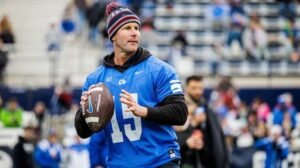Breaking Information: After suing the NCAA last month for a fifth year of eligibility, Tennessee guard Zakai Zeigler’s request for a preliminary injunction was denied by a federal judge in Tennessee on Thursday. Zeigler filed a fifth-year lawsuit against the NCAA, alleging he may forfeit up to $4 million in NIL funds if…

In a significant setback for Tennessee basketball star Zakai Zeigler, a federal judge in Tennessee denied his request for a preliminary injunction against the NCAA on Thursday. Zeigler, who filed a lawsuit last month seeking a fifth year of collegiate eligibility, alleged that the NCAA’s denial of his waiver could cost him up to $4 million in potential Name, Image, and Likeness (NIL) earnings.
Zeigler, a standout guard for the Tennessee Volunteers, initiated legal proceedings in May, arguing that the NCAA unfairly denied him an extra year of eligibility despite circumstances he claims were beyond his control. The lawsuit contends that the organization’s policies are inconsistently applied and violate athletes’ rights under federal law.
His legal team sought an emergency injunction that would have allowed him to continue practicing and competing with the Volunteers while the case moved through the courts. In Thursday’s ruling, however, U.S. District Judge Marvin Tate denied the motion, citing a lack of sufficient evidence that Zeigler would suffer “irreparable harm” without immediate relief. The judge noted that while the financial implications of NIL deals are significant, they do not meet the legal standard for emergency intervention.
Zeigler’s Case: Eligibility and Economic Stakes
Zakai Zeigler, known for his leadership and gritty defense, was a crucial part of Tennessee’s success in recent seasons. The 5-foot-9 guard played four years with the program and was seeking a medical hardship waiver for an additional year, citing a knee injury suffered in the 2022–2023 season that limited his play.
In the lawsuit, Zeigler claimed the NCAA’s denial of the waiver violated due process and disproportionately impacted his ability to capitalize on NIL deals, which have become a critical revenue stream for top college athletes. According to filings, Zeigler’s projected NIL value in a fifth year could exceed $4 million, with endorsement deals and social media campaigns already in negotiation stages.
“We believe the NCAA has arbitrarily applied its rules in Mr. Zeigler’s case,” his attorney, Rachel Lambert, said in a statement last month. “Zakai has not only met the eligibility criteria under the hardship guidelines, but is also being denied the opportunity to earn income and further his education.”
NCAA’s Response and Legal Precedent
The NCAA has maintained that Zeigler’s four years of competition already fulfill his eligibility limits, and his waiver request did not meet the criteria for exception. A spokesperson for the organization stated that while they recognize the evolving NIL landscape, the fundamental eligibility rules remain grounded in fairness and consistency.
Legal analysts say the denial of the preliminary injunction doesn’t decide the overall case, but it does make it unlikely that Zeigler will take the court in the upcoming college season.
“This ruling doesn’t close the door on his lawsuit, but it definitely closes the window on a 2025–26 season,” said Danielle Kim, a sports law expert at Vanderbilt University. “Unless the court rules in his favor in a remarkably swift fashion, his college playing days may be over.”
What’s Next?
The case will proceed to trial unless settled or dismissed, and both sides are expected to file further motions in the coming weeks. For Zeigler, the decision now shifts from the court to how he navigates his professional options, whether that be the NBA G League, overseas opportunities, or training for the 2026 NBA Draft.
Meanwhile, the case adds to the growing list of legal battles testing the NCAA’s authority amid the changing financial and legal dynamics of college sports. With NIL, transfer rules, and eligibility waivers under increasing scrutiny, Zeigler’s lawsuit could still have long-term implications—even if it doesn’t win him a final season in orange and white.











Post Comment